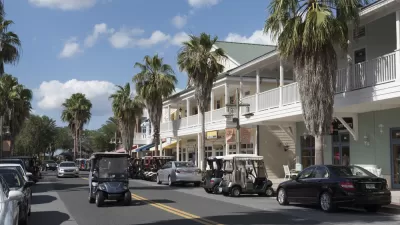The first regional plan passed under landmark SB 375 requiring MPOs to reduce greenhouse gas emissions has failed a key test. Environmental plaintiffs sued because transit investments were in the future. They won, forcing SANDAG to redo their plan.
The lawsuit was a major test of California's landmark climate protection law, SB 375, which requires regional planning agencies to reduce transporation-related greenhouse gas emissions. The regional planning agency for the San Diego area, SANDAG, was the first of the 18 metropolitan planning organizations (MPOs) in the state to prepare such a long range plan under the 2008 climate law.
Damien Newton writes that "(w)hen it was passed last March, the long-term transportation plan was hailed as 'visionary' for its investment in transit, bicycling and pedestrian projects. A few local voices fought back, arguing that the green transportation investments were all in the latter years of the thirty year plan. Proposed investments in new toll lanes would not bring the air quality benefits planners promised. They filed suit. The established powers laughed. Then, State Attorney General Kamala Harris joined the suit. All of a sudden, the lawsuit was front page news."
“If this is a national and regional model, we’re in bad shape,” Dough McFetridge of the Cleveland National Forest Foundation grumbled to Streetsblog last November. ”We have a need — a tremendous need — for transit right now, today. This proposal puts funding transit off into so far in to the future that many of us won’t be around anymore.”
On Dec. 4, "Superior Court Judge Timothy Taylor ruled that the San Diego Association of Governments (SANDAG) violated state law by failing to fully account for, and take steps to reduce, climate pollution in its environmental review of the region’s long-term transportation plan in the environmental review of the Long Term Plan. The ruling is a major rebuke to regional planners in the San Diego region and a warning shot to other regional planning organizations that just passing a plan and calling it green is no longer enough."
"The court is setting an important example here for regional planning agencies throughout California,” said Kathryn Phillips, director of Sierra Club California. “We cannot wait another 40 years to adopt sensible transportation and land-use policies. Thanks to California laws requiring public agencies to be open about their plans, we were able to hold SANDAG accountable for its faulty planning practices.”
"SANDAG must now conduct new environmental review for its 2050 plan to ensure it adequately addresses the risk of climate change. The plaintiffs believe it is likely that the more rigorous environmental review will lead to a revised plan that does a better job of reducing greenhouse gas emissions, as required by state law."
FULL STORY: Judge Rules Transportation Plan in San Diego Violates State Enviro. Laws

Maui's Vacation Rental Debate Turns Ugly
Verbal attacks, misinformation campaigns and fistfights plague a high-stakes debate to convert thousands of vacation rentals into long-term housing.

Planetizen Federal Action Tracker
A weekly monitor of how Trump’s orders and actions are impacting planners and planning in America.

In Urban Planning, AI Prompting Could be the New Design Thinking
Creativity has long been key to great urban design. What if we see AI as our new creative partner?

King County Supportive Housing Program Offers Hope for Unhoused Residents
The county is taking a ‘Housing First’ approach that prioritizes getting people into housing, then offering wraparound supportive services.

Researchers Use AI to Get Clearer Picture of US Housing
Analysts are using artificial intelligence to supercharge their research by allowing them to comb through data faster. Though these AI tools can be error prone, they save time and housing researchers are optimistic about the future.

Making Shared Micromobility More Inclusive
Cities and shared mobility system operators can do more to include people with disabilities in planning and operations, per a new report.
Urban Design for Planners 1: Software Tools
This six-course series explores essential urban design concepts using open source software and equips planners with the tools they need to participate fully in the urban design process.
Planning for Universal Design
Learn the tools for implementing Universal Design in planning regulations.
planning NEXT
Appalachian Highlands Housing Partners
Mpact (founded as Rail~Volution)
City of Camden Redevelopment Agency
City of Astoria
City of Portland
City of Laramie



























